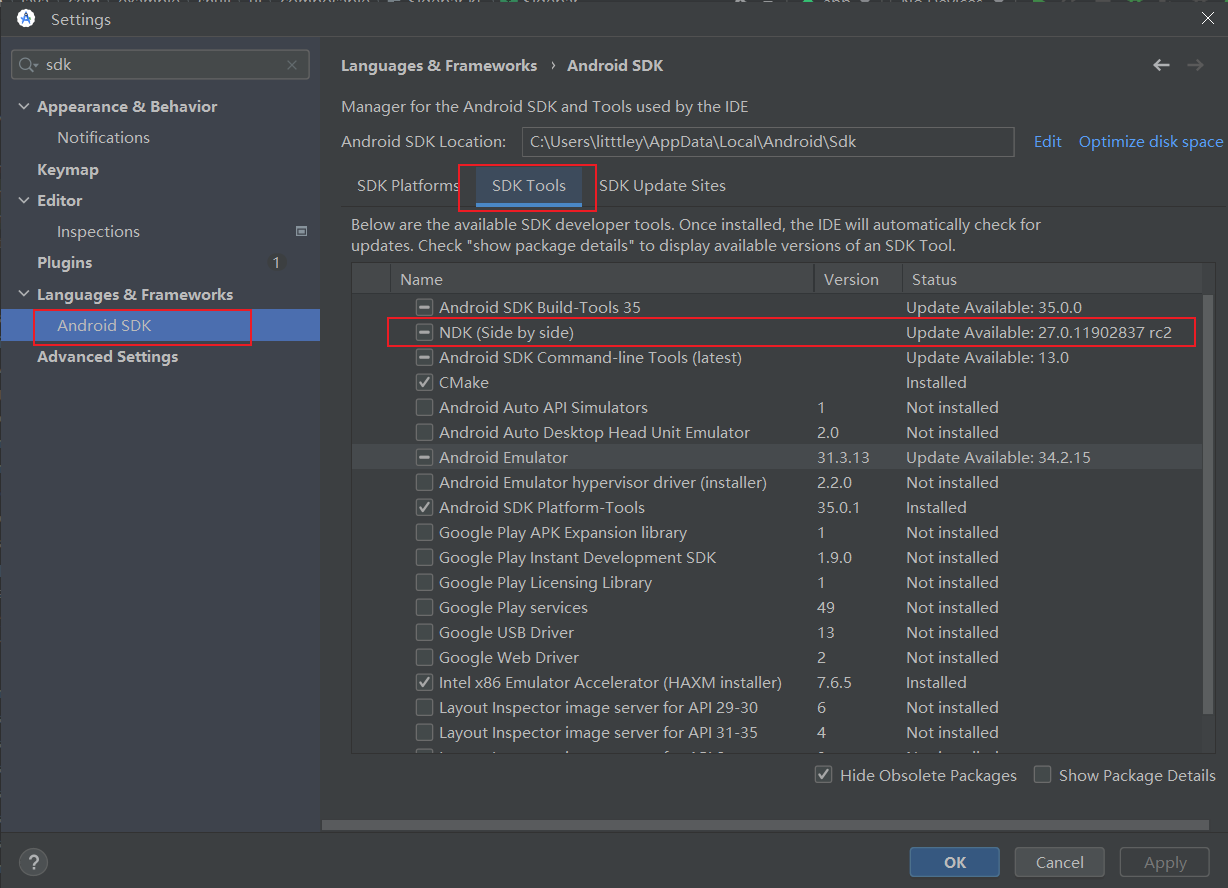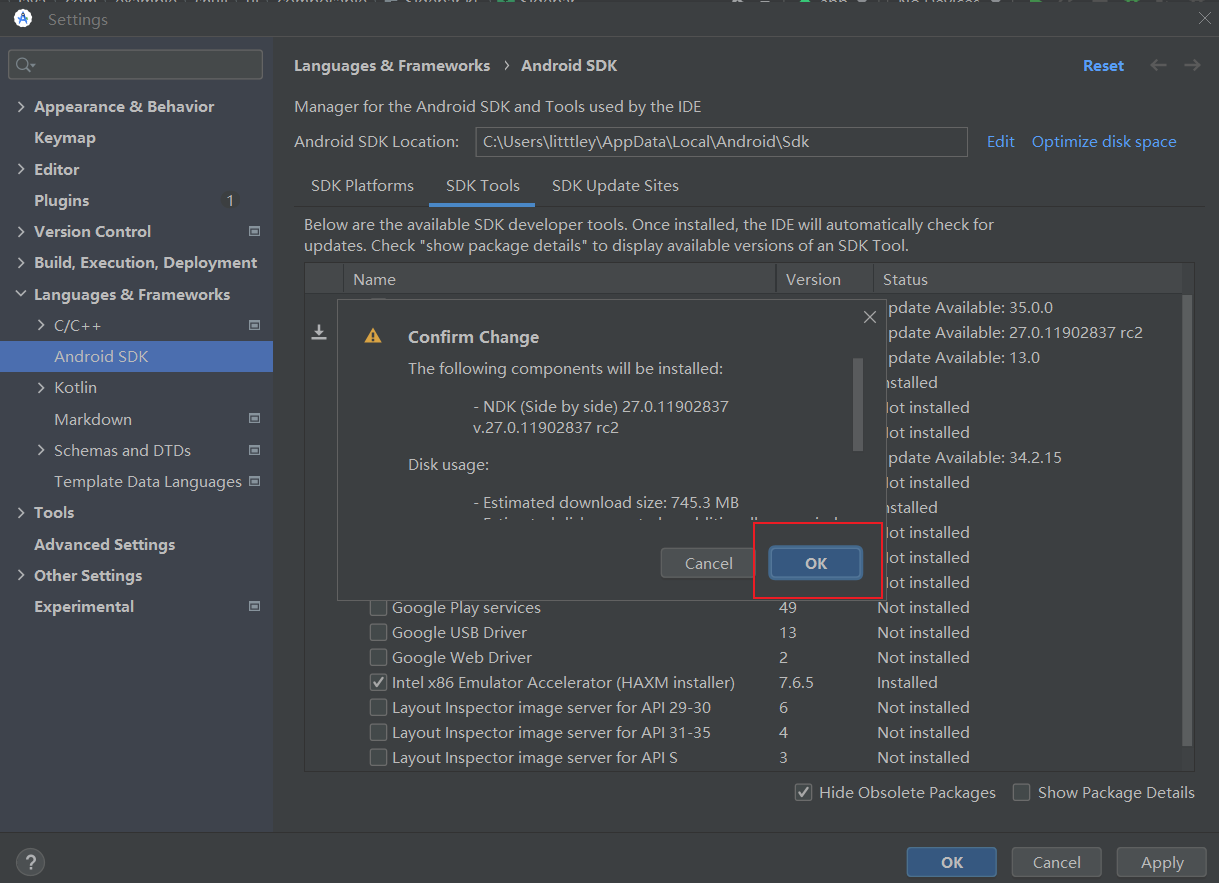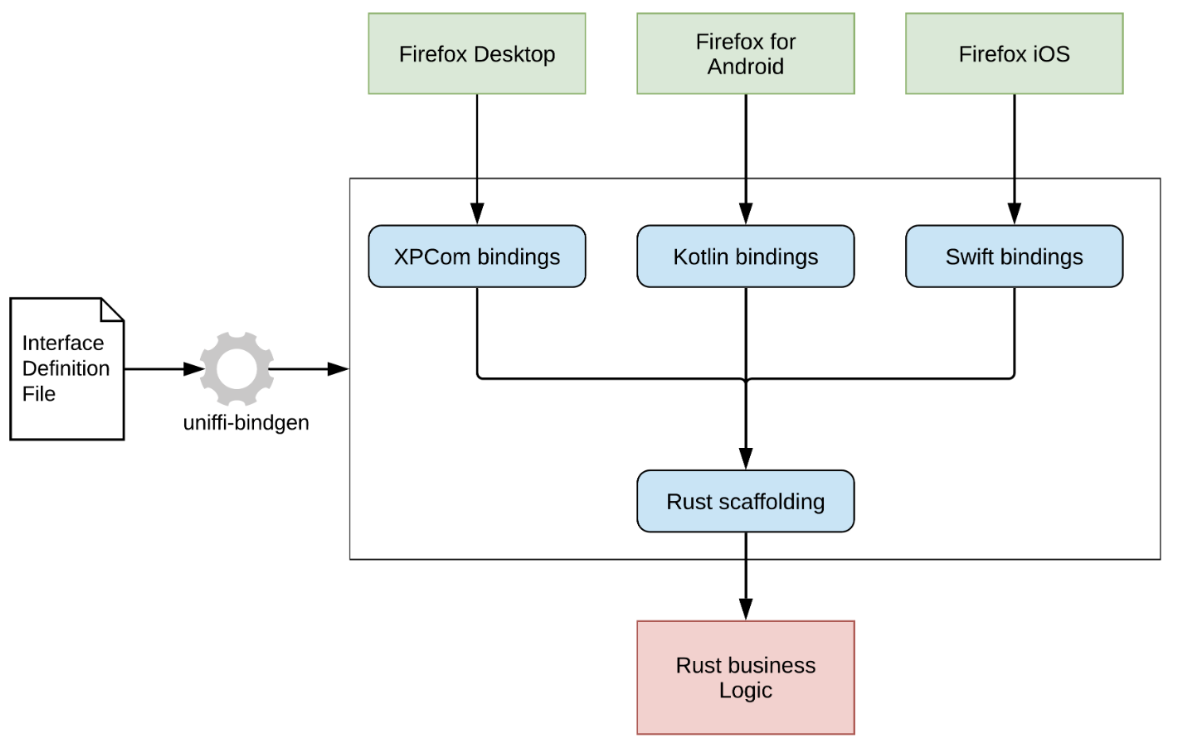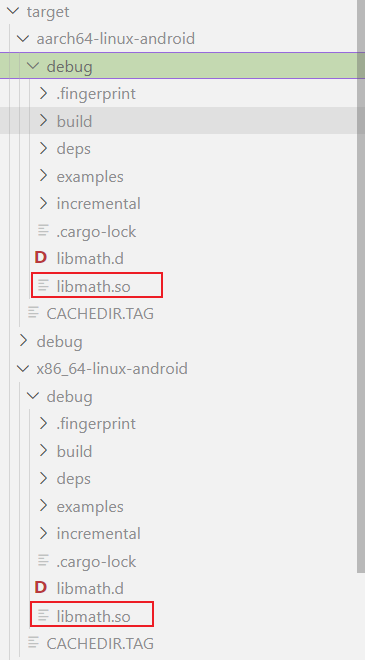rust-android库交叉编译
安装ndk环境
-
先按装anroid studio,通过anroid studio SDK Manager安装ndk
-
打开android studio file-setting,找到android sdk选项如下图

选中sdk tools下ndk选项点击下载。

默认下载路径C:\Users\litttley\AppData\Local\Android\Sdk\ndk,我这里之前安装过一版本。

添加环境变量NDK-HOME

然后新建path添加 %NDK_HOME%
命令行输入
C:\Users\litttley>ndk-build
Android NDK: Could not find application project directory !
Android NDK: Please define the NDK_PROJECT_PATH variable to point to it.
C:\Users\litttley\AppData\Local\Android\Sdk\ndk\25.1.8937393\build\..\build\core\build-local.mk:151: *** Android NDK: Aborting . Stop.
能输出C:\Users\litttley\AppData\Local\Android\Sdk\ndk\25.1.8937393\build\..\build\core\build-local.mk:151:信息表示ndk-build已经可用了。
配置config.toml
C:\\Users\litttley\\.cargo\\config.toml文件写入如下内容:
或在rust lib 项目下建.cargo/config.toml,编译时会优先查到项目下的配置,这样就不需要改动全局配置
添加交叉编译配置[target.aarch64-linux-android] 与[target.armv7-linux-androideabi]
[source.crates-io]
# To use sparse index, change 'rsproxy' to 'rsproxy-sparse'
replace-with = 'rsproxy'
[source.rsproxy]
registry = "https://rsproxy.cn/crates.io-index"
[source.rsproxy-sparse]
registry = "sparse+https://rsproxy.cn/index/"
[registries.rsproxy]
index = "https://rsproxy.cn/crates.io-index"
[net]
git-fetch-with-cli = true
[target.aarch64-linux-android]
ar = "C:/Users/litttley/AppData/Local/Android/Sdk\ndk/25.1.8937393/toolchains/llvm/prebuilt/windows-x86_64/bin/llvm-ar.exe"
linker = "C:/Users/litttley/AppData/Local/Android/Sdk/ndk/25.1.8937393/toolchains/llvm/prebuilt/windows-x86_64/bin/aarch64-linux-android21-clang++.cmd"
[target.armv7-linux-androideabi]
ar = "C:/Users/litttley/AppData/Local/Android/Sdk/ndk/25.1.8937393/toolchains/llvm/prebuilt/windows-x86_64/bin/llvm-ar.exe"
linker = "C:/Users/litttley/AppData/Local/Android/Sdk/ndk/25.1.8937393/toolchains/llvm/prebuilt/windows-x86_64/bin/armv7a-linux-androideabi21-clang++.cmd"
[target.x86_64-linux-android]
ar = "C:/Users/litttley/AppData/Local/Android/Sdk/ndk/25.1.8937393/toolchains/llvm/prebuilt/windows-x86_64/bin/llvm-ar.exe"
linker = "C:/Users/litttley/AppData/Local/Android/Sdk/ndk/25.1.8937393/toolchains/llvm/prebuilt/windows-x86_64/bin/x86_64-linux-android21-clang++.cmd"
注意路径分隔使用/号,否则容易报错
添加工具链
rustup target add aarch64-linux-android
rustup target add armv7-linux-androideabi
rustup target add x86_64-linux-android
使用rustup target list可查看已安装的工具链
至此rust 在window平台上环境配置已完成。
使用uniffi库
uniffi-rs 是 rust 多语言bindings 生成工具,为不同开语言生成rust native的绑定,简化native代码调用难度。
主要支持Kotlin,Swift,Python,Ruby 。

android开发主要生成kotlin的本地库绑定
uniffi-rs 文档 https://mozilla.github.io/uniffi-rs/latest/bindings.html
参照文档教程
项目math
使用cargo new --lib math创建项目,
Cargo.toml内容如下
[dependencies]
uniffi = { version = "0.28" ,features = [ "cli" ] }
[build-dependencies]
uniffi = { version = "0.28", features = [ "build","cli" ] }
[lib]
crate-type = ["cdylib"]
[[bin]]
# This can be whatever name makes sense for your project, but the rest of this tutorial assumes uniffi-bindgen.
name = "uniffi-bindgen"
path = "uniffi-bindgen.rs"
在src目录下创建uniffi-bindgen.rs
fn main() {
uniffi::uniffi_bindgen_main()
}
lib.rs
uniffi::setup_scaffolding!();
#[uniffi::export]
fn add(a: u32, b: u32) -> u32 {
a + b
}
pub fn add1(left: usize, right: usize) -> usize {
left + right
}
#[cfg(test)]
mod tests {
use super::*;
#[test]
fn it_works() {
let result = add1(2, 2);
assert_eq!(result, 4);
}
}
uniffi::setup_scaffolding!();表示启用宏函数来#[uniffi::export]来描术要导出的函数,uniffi还有一种使用udl文件描述的方式,这里就不介绍了。
在src目录下创建 uniffi.toml,内容如下
[bindings.kotlin]
package_name = "com.test.math"
android = true
# [bindings.kotlin.external_packages]
# # This specifies that external types from the crate `rust-crate-name` will be referred by by the package `"kotlin.package.name`.
# rust-crate-name = "kotlin.package.name"
主要定义导出包名
在src目录下创建 rust-toolchain.toml,内容如下
[toolchain]
channel = "nightly-2024-06-14"
targets = ["aarch64-linux-android", "x86_64-linux-android"]
profile = "default"
这是项目级别配置工具链,uniffi只支持nightly版本,如果没有安装,首次运行自动安装。
在src目录下创建.cargo/config.toml,内容如下
[source.crates-io]
# To use sparse index, change 'rsproxy' to 'rsproxy-sparse'
replace-with = 'rsproxy'
[source.rsproxy]
registry = "https://rsproxy.cn/crates.io-index"
[source.rsproxy-sparse]
registry = "sparse+https://rsproxy.cn/index/"
[registries.rsproxy]
index = "https://rsproxy.cn/crates.io-index"
[net]
git-fetch-with-cli = true
[target.aarch64-linux-android]
ar = "C:/Users/litttley/AppData/Local/Android/Sdk\ndk/25.1.8937393/toolchains/llvm/prebuilt/windows-x86_64/bin/llvm-ar.exe"
linker = "C:/Users/litttley/AppData/Local/Android/Sdk/ndk/25.1.8937393/toolchains/llvm/prebuilt/windows-x86_64/bin/aarch64-linux-android21-clang++.cmd"
[target.armv7-linux-androideabi]
ar = "C:/Users/litttley/AppData/Local/Android/Sdk/ndk/25.1.8937393/toolchains/llvm/prebuilt/windows-x86_64/bin/llvm-ar.exe"
linker = "C:/Users/litttley/AppData/Local/Android/Sdk/ndk/25.1.8937393/toolchains/llvm/prebuilt/windows-x86_64/bin/armv7a-linux-androideabi21-clang++.cmd"
[target.x86_64-linux-android]
ar = "C:/Users/litttley/AppData/Local/Android/Sdk/ndk/25.1.8937393/toolchains/llvm/prebuilt/windows-x86_64/bin/llvm-ar.exe"
linker = "C:/Users/litttley/AppData/Local/Android/Sdk/ndk/25.1.8937393/toolchains/llvm/prebuilt/windows-x86_64/bin/x86_64-linux-android21-clang++.cmd"
项目级别编译配置。
运行
debug
cargo build --lib --target aarch64-linux-android
cargo build --lib --target x86_64-linux-android
release
cargo build --lib --release --target aarch64-linux-android
cargo build --lib --release --target x86_64-linux-android
在target目录下可找到libmath.so

成生kotlin绑定
cargo run --features uniffi/cli --bin uniffi-bindgen generate --library target/aarch64-linux-android/debug/libmath.so --language kotlin --out-dir out_dir
注意:生成绑定是使用target/aarch64-linux-android下的so文件
生成的math.kt
// This file was autogenerated by some hot garbage in the `uniffi` crate.
// Trust me, you don't want to mess with it!
@file:Suppress("NAME_SHADOWING")
package uniffi.math
// Common helper code.
//
// Ideally this would live in a separate .kt file where it can be unittested etc
// in isolation, and perhaps even published as a re-useable package.
//
// However, it's important that the details of how this helper code works (e.g. the
// way that different builtin types are passed across the FFI) exactly match what's
// expected by the Rust code on the other side of the interface. In practice right
// now that means coming from the exact some version of `uniffi` that was used to
// compile the Rust component. The easiest way to ensure this is to bundle the Kotlin
// helpers directly inline like we're doing here.
import com.sun.jna.Library
import com.sun.jna.IntegerType
import com.sun.jna.Native
import com.sun.jna.Pointer
import com.sun.jna.Structure
import com.sun.jna.Callback
import com.sun.jna.ptr.*
import java.nio.ByteBuffer
import java.nio.ByteOrder
import java.nio.CharBuffer
import java.nio.charset.CodingErrorAction
import java.util.concurrent.atomic.AtomicLong
import java.util.concurrent.ConcurrentHashMap
// This is a helper for safely working with byte buffers returned from the Rust code.
// A rust-owned buffer is represented by its capacity, its current length, and a
// pointer to the underlying data.
@Structure.FieldOrder("capacity", "len", "data")
open class RustBuffer : Structure() {
// Note: `capacity` and `len` are actually `ULong` values, but JVM only supports signed values.
// When dealing with these fields, make sure to call `toULong()`.
@JvmField var capacity: Long = 0
@JvmField var len: Long = 0
@JvmField var data: Pointer? = null
class ByValue: RustBuffer(), Structure.ByValue
class ByReference: RustBuffer(), Structure.ByReference
internal fun setValue(other: RustBuffer) {
capacity = other.capacity
len = other.len
data = other.data
}
companion object {
internal fun alloc(size: ULong = 0UL) = uniffiRustCall() { status ->
// Note: need to convert the size to a `Long` value to make this work with JVM.
UniffiLib.INSTANCE.ffi_math_rustbuffer_alloc(size.toLong(), status)
}.also {
if(it.data == null) {
throw RuntimeException("RustBuffer.alloc() returned null data pointer (size=${size})")
}
}
internal fun create(capacity: ULong, len: ULong, data: Pointer?): RustBuffer.ByValue {
var buf = RustBuffer.ByValue()
buf.capacity = capacity.toLong()
buf.len = len.toLong()
buf.data = data
return buf
}
internal fun free(buf: RustBuffer.ByValue) = uniffiRustCall() { status ->
UniffiLib.INSTANCE.ffi_math_rustbuffer_free(buf, status)
}
}
@Suppress("TooGenericExceptionThrown")
fun asByteBuffer() =
this.data?.getByteBuffer(0, this.len.toLong())?.also {
it.order(ByteOrder.BIG_ENDIAN)
}
}
/**
* The equivalent of the `*mut RustBuffer` type.
* Required for callbacks taking in an out pointer.
*
* Size is the sum of all values in the struct.
*/
class RustBufferByReference : ByReference(16) {
/**
* Set the pointed-to `RustBuffer` to the given value.
*/
fun setValue(value: RustBuffer.ByValue) {
// NOTE: The offsets are as they are in the C-like struct.
val pointer = getPointer()
pointer.setLong(0, value.capacity)
pointer.setLong(8, value.len)
pointer.setPointer(16, value.data)
}
/**
* Get a `RustBuffer.ByValue` from this reference.
*/
fun getValue(): RustBuffer.ByValue {
val pointer = getPointer()
val value = RustBuffer.ByValue()
value.writeField("capacity", pointer.getLong(0))
value.writeField("len", pointer.getLong(8))
value.writeField("data", pointer.getLong(16))
return value
}
}
// This is a helper for safely passing byte references into the rust code.
// It's not actually used at the moment, because there aren't many things that you
// can take a direct pointer to in the JVM, and if we're going to copy something
// then we might as well copy it into a `RustBuffer`. But it's here for API
// completeness.
@Structure.FieldOrder("len", "data")
open class ForeignBytes : Structure() {
@JvmField var len: Int = 0
@JvmField var data: Pointer? = null
class ByValue : ForeignBytes(), Structure.ByValue
}
// The FfiConverter interface handles converter types to and from the FFI
//
// All implementing objects should be public to support external types. When a
// type is external we need to import it's FfiConverter.
public interface FfiConverter<KotlinType, FfiType> {
// Convert an FFI type to a Kotlin type
fun lift(value: FfiType): KotlinType
// Convert an Kotlin type to an FFI type
fun lower(value: KotlinType): FfiType
// Read a Kotlin type from a `ByteBuffer`
fun read(buf: ByteBuffer): KotlinType
// Calculate bytes to allocate when creating a `RustBuffer`
//
// This must return at least as many bytes as the write() function will
// write. It can return more bytes than needed, for example when writing
// Strings we can't know the exact bytes needed until we the UTF-8
// encoding, so we pessimistically allocate the largest size possible (3
// bytes per codepoint). Allocating extra bytes is not really a big deal
// because the `RustBuffer` is short-lived.
fun allocationSize(value: KotlinType): ULong
// Write a Kotlin type to a `ByteBuffer`
fun write(value: KotlinType, buf: ByteBuffer)
// Lower a value into a `RustBuffer`
//
// This method lowers a value into a `RustBuffer` rather than the normal
// FfiType. It's used by the callback interface code. Callback interface
// returns are always serialized into a `RustBuffer` regardless of their
// normal FFI type.
fun lowerIntoRustBuffer(value: KotlinType): RustBuffer.ByValue {
val rbuf = RustBuffer.alloc(allocationSize(value))
try {
val bbuf = rbuf.data!!.getByteBuffer(0, rbuf.capacity).also {
it.order(ByteOrder.BIG_ENDIAN)
}
write(value, bbuf)
rbuf.writeField("len", bbuf.position().toLong())
return rbuf
} catch (e: Throwable) {
RustBuffer.free(rbuf)
throw e
}
}
// Lift a value from a `RustBuffer`.
//
// This here mostly because of the symmetry with `lowerIntoRustBuffer()`.
// It's currently only used by the `FfiConverterRustBuffer` class below.
fun liftFromRustBuffer(rbuf: RustBuffer.ByValue): KotlinType {
val byteBuf = rbuf.asByteBuffer()!!
try {
val item = read(byteBuf)
if (byteBuf.hasRemaining()) {
throw RuntimeException("junk remaining in buffer after lifting, something is very wrong!!")
}
return item
} finally {
RustBuffer.free(rbuf)
}
}
}
// FfiConverter that uses `RustBuffer` as the FfiType
public interface FfiConverterRustBuffer<KotlinType>: FfiConverter<KotlinType, RustBuffer.ByValue> {
override fun lift(value: RustBuffer.ByValue) = liftFromRustBuffer(value)
override fun lower(value: KotlinType) = lowerIntoRustBuffer(value)
}
// A handful of classes and functions to support the generated data structures.
// This would be a good candidate for isolating in its own ffi-support lib.
internal const val UNIFFI_CALL_SUCCESS = 0.toByte()
internal const val UNIFFI_CALL_ERROR = 1.toByte()
internal const val UNIFFI_CALL_UNEXPECTED_ERROR = 2.toByte()
@Structure.FieldOrder("code", "error_buf")
internal open class UniffiRustCallStatus : Structure() {
@JvmField var code: Byte = 0
@JvmField var error_buf: RustBuffer.ByValue = RustBuffer.ByValue()
class ByValue: UniffiRustCallStatus(), Structure.ByValue
fun isSuccess(): Boolean {
return code == UNIFFI_CALL_SUCCESS
}
fun isError(): Boolean {
return code == UNIFFI_CALL_ERROR
}
fun isPanic(): Boolean {
return code == UNIFFI_CALL_UNEXPECTED_ERROR
}
companion object {
fun create(code: Byte, errorBuf: RustBuffer.ByValue): UniffiRustCallStatus.ByValue {
val callStatus = UniffiRustCallStatus.ByValue()
callStatus.code = code
callStatus.error_buf = errorBuf
return callStatus
}
}
}
class InternalException(message: String) : kotlin.Exception(message)
// Each top-level error class has a companion object that can lift the error from the call status's rust buffer
interface UniffiRustCallStatusErrorHandler<E> {
fun lift(error_buf: RustBuffer.ByValue): E;
}
// Helpers for calling Rust
// In practice we usually need to be synchronized to call this safely, so it doesn't
// synchronize itself
// Call a rust function that returns a Result<>. Pass in the Error class companion that corresponds to the Err
private inline fun <U, E: kotlin.Exception> uniffiRustCallWithError(errorHandler: UniffiRustCallStatusErrorHandler<E>, callback: (UniffiRustCallStatus) -> U): U {
var status = UniffiRustCallStatus()
val return_value = callback(status)
uniffiCheckCallStatus(errorHandler, status)
return return_value
}
// Check UniffiRustCallStatus and throw an error if the call wasn't successful
private fun<E: kotlin.Exception> uniffiCheckCallStatus(errorHandler: UniffiRustCallStatusErrorHandler<E>, status: UniffiRustCallStatus) {
if (status.isSuccess()) {
return
} else if (status.isError()) {
throw errorHandler.lift(status.error_buf)
} else if (status.isPanic()) {
// when the rust code sees a panic, it tries to construct a rustbuffer
// with the message. but if that code panics, then it just sends back
// an empty buffer.
if (status.error_buf.len > 0) {
throw InternalException(FfiConverterString.lift(status.error_buf))
} else {
throw InternalException("Rust panic")
}
} else {
throw InternalException("Unknown rust call status: $status.code")
}
}
// UniffiRustCallStatusErrorHandler implementation for times when we don't expect a CALL_ERROR
object UniffiNullRustCallStatusErrorHandler: UniffiRustCallStatusErrorHandler<InternalException> {
override fun lift(error_buf: RustBuffer.ByValue): InternalException {
RustBuffer.free(error_buf)
return InternalException("Unexpected CALL_ERROR")
}
}
// Call a rust function that returns a plain value
private inline fun <U> uniffiRustCall(callback: (UniffiRustCallStatus) -> U): U {
return uniffiRustCallWithError(UniffiNullRustCallStatusErrorHandler, callback)
}
internal inline fun<T> uniffiTraitInterfaceCall(
callStatus: UniffiRustCallStatus,
makeCall: () -> T,
writeReturn: (T) -> Unit,
) {
try {
writeReturn(makeCall())
} catch(e: kotlin.Exception) {
callStatus.code = UNIFFI_CALL_UNEXPECTED_ERROR
callStatus.error_buf = FfiConverterString.lower(e.toString())
}
}
internal inline fun<T, reified E: Throwable> uniffiTraitInterfaceCallWithError(
callStatus: UniffiRustCallStatus,
makeCall: () -> T,
writeReturn: (T) -> Unit,
lowerError: (E) -> RustBuffer.ByValue
) {
try {
writeReturn(makeCall())
} catch(e: kotlin.Exception) {
if (e is E) {
callStatus.code = UNIFFI_CALL_ERROR
callStatus.error_buf = lowerError(e)
} else {
callStatus.code = UNIFFI_CALL_UNEXPECTED_ERROR
callStatus.error_buf = FfiConverterString.lower(e.toString())
}
}
}
// Map handles to objects
//
// This is used pass an opaque 64-bit handle representing a foreign object to the Rust code.
internal class UniffiHandleMap<T: Any> {
private val map = ConcurrentHashMap<Long, T>()
private val counter = java.util.concurrent.atomic.AtomicLong(0)
val size: Int
get() = map.size
// Insert a new object into the handle map and get a handle for it
fun insert(obj: T): Long {
val handle = counter.getAndAdd(1)
map.put(handle, obj)
return handle
}
// Get an object from the handle map
fun get(handle: Long): T {
return map.get(handle) ?: throw InternalException("UniffiHandleMap.get: Invalid handle")
}
// Remove an entry from the handlemap and get the Kotlin object back
fun remove(handle: Long): T {
return map.remove(handle) ?: throw InternalException("UniffiHandleMap: Invalid handle")
}
}
// Contains loading, initialization code,
// and the FFI Function declarations in a com.sun.jna.Library.
@Synchronized
private fun findLibraryName(componentName: String): String {
val libOverride = System.getProperty("uniffi.component.$componentName.libraryOverride")
if (libOverride != null) {
return libOverride
}
return "math"
}
private inline fun <reified Lib : Library> loadIndirect(
componentName: String
): Lib {
return Native.load<Lib>(findLibraryName(componentName), Lib::class.java)
}
// Define FFI callback types
internal interface UniffiRustFutureContinuationCallback : com.sun.jna.Callback {
fun callback(`data`: Long,`pollResult`: Byte,)
}
internal interface UniffiForeignFutureFree : com.sun.jna.Callback {
fun callback(`handle`: Long,)
}
internal interface UniffiCallbackInterfaceFree : com.sun.jna.Callback {
fun callback(`handle`: Long,)
}
@Structure.FieldOrder("handle", "free")
internal open class UniffiForeignFuture(
@JvmField internal var `handle`: Long = 0.toLong(),
@JvmField internal var `free`: UniffiForeignFutureFree? = null,
) : Structure() {
class UniffiByValue(
`handle`: Long = 0.toLong(),
`free`: UniffiForeignFutureFree? = null,
): UniffiForeignFuture(`handle`,`free`,), Structure.ByValue
internal fun uniffiSetValue(other: UniffiForeignFuture) {
`handle` = other.`handle`
`free` = other.`free`
}
}
@Structure.FieldOrder("returnValue", "callStatus")
internal open class UniffiForeignFutureStructU8(
@JvmField internal var `returnValue`: Byte = 0.toByte(),
@JvmField internal var `callStatus`: UniffiRustCallStatus.ByValue = UniffiRustCallStatus.ByValue(),
) : Structure() {
class UniffiByValue(
`returnValue`: Byte = 0.toByte(),
`callStatus`: UniffiRustCallStatus.ByValue = UniffiRustCallStatus.ByValue(),
): UniffiForeignFutureStructU8(`returnValue`,`callStatus`,), Structure.ByValue
internal fun uniffiSetValue(other: UniffiForeignFutureStructU8) {
`returnValue` = other.`returnValue`
`callStatus` = other.`callStatus`
}
}
internal interface UniffiForeignFutureCompleteU8 : com.sun.jna.Callback {
fun callback(`callbackData`: Long,`result`: UniffiForeignFutureStructU8.UniffiByValue,)
}
@Structure.FieldOrder("returnValue", "callStatus")
internal open class UniffiForeignFutureStructI8(
@JvmField internal var `returnValue`: Byte = 0.toByte(),
@JvmField internal var `callStatus`: UniffiRustCallStatus.ByValue = UniffiRustCallStatus.ByValue(),
) : Structure() {
class UniffiByValue(
`returnValue`: Byte = 0.toByte(),
`callStatus`: UniffiRustCallStatus.ByValue = UniffiRustCallStatus.ByValue(),
): UniffiForeignFutureStructI8(`returnValue`,`callStatus`,), Structure.ByValue
internal fun uniffiSetValue(other: UniffiForeignFutureStructI8) {
`returnValue` = other.`returnValue`
`callStatus` = other.`callStatus`
}
}
internal interface UniffiForeignFutureCompleteI8 : com.sun.jna.Callback {
fun callback(`callbackData`: Long,`result`: UniffiForeignFutureStructI8.UniffiByValue,)
}
@Structure.FieldOrder("returnValue", "callStatus")
internal open class UniffiForeignFutureStructU16(
@JvmField internal var `returnValue`: Short = 0.toShort(),
@JvmField internal var `callStatus`: UniffiRustCallStatus.ByValue = UniffiRustCallStatus.ByValue(),
) : Structure() {
class UniffiByValue(
`returnValue`: Short = 0.toShort(),
`callStatus`: UniffiRustCallStatus.ByValue = UniffiRustCallStatus.ByValue(),
): UniffiForeignFutureStructU16(`returnValue`,`callStatus`,), Structure.ByValue
internal fun uniffiSetValue(other: UniffiForeignFutureStructU16) {
`returnValue` = other.`returnValue`
`callStatus` = other.`callStatus`
}
}
internal interface UniffiForeignFutureCompleteU16 : com.sun.jna.Callback {
fun callback(`callbackData`: Long,`result`: UniffiForeignFutureStructU16.UniffiByValue,)
}
@Structure.FieldOrder("returnValue", "callStatus")
internal open class UniffiForeignFutureStructI16(
@JvmField internal var `returnValue`: Short = 0.toShort(),
@JvmField internal var `callStatus`: UniffiRustCallStatus.ByValue = UniffiRustCallStatus.ByValue(),
) : Structure() {
class UniffiByValue(
`returnValue`: Short = 0.toShort(),
`callStatus`: UniffiRustCallStatus.ByValue = UniffiRustCallStatus.ByValue(),
): UniffiForeignFutureStructI16(`returnValue`,`callStatus`,), Structure.ByValue
internal fun uniffiSetValue(other: UniffiForeignFutureStructI16) {
`returnValue` = other.`returnValue`
`callStatus` = other.`callStatus`
}
}
internal interface UniffiForeignFutureCompleteI16 : com.sun.jna.Callback {
fun callback(`callbackData`: Long,`result`: UniffiForeignFutureStructI16.UniffiByValue,)
}
@Structure.FieldOrder("returnValue", "callStatus")
internal open class UniffiForeignFutureStructU32(
@JvmField internal var `returnValue`: Int = 0,
@JvmField internal var `callStatus`: UniffiRustCallStatus.ByValue = UniffiRustCallStatus.ByValue(),
) : Structure() {
class UniffiByValue(
`returnValue`: Int = 0,
`callStatus`: UniffiRustCallStatus.ByValue = UniffiRustCallStatus.ByValue(),
): UniffiForeignFutureStructU32(`returnValue`,`callStatus`,), Structure.ByValue
internal fun uniffiSetValue(other: UniffiForeignFutureStructU32) {
`returnValue` = other.`returnValue`
`callStatus` = other.`callStatus`
}
}
internal interface UniffiForeignFutureCompleteU32 : com.sun.jna.Callback {
fun callback(`callbackData`: Long,`result`: UniffiForeignFutureStructU32.UniffiByValue,)
}
@Structure.FieldOrder("returnValue", "callStatus")
internal open class UniffiForeignFutureStructI32(
@JvmField internal var `returnValue`: Int = 0,
@JvmField internal var `callStatus`: UniffiRustCallStatus.ByValue = UniffiRustCallStatus.ByValue(),
) : Structure() {
class UniffiByValue(
`returnValue`: Int = 0,
`callStatus`: UniffiRustCallStatus.ByValue = UniffiRustCallStatus.ByValue(),
): UniffiForeignFutureStructI32(`returnValue`,`callStatus`,), Structure.ByValue
internal fun uniffiSetValue(other: UniffiForeignFutureStructI32) {
`returnValue` = other.`returnValue`
`callStatus` = other.`callStatus`
}
}
internal interface UniffiForeignFutureCompleteI32 : com.sun.jna.Callback {
fun callback(`callbackData`: Long,`result`: UniffiForeignFutureStructI32.UniffiByValue,)
}
@Structure.FieldOrder("returnValue", "callStatus")
internal open class UniffiForeignFutureStructU64(
@JvmField internal var `returnValue`: Long = 0.toLong(),
@JvmField internal var `callStatus`: UniffiRustCallStatus.ByValue = UniffiRustCallStatus.ByValue(),
) : Structure() {
class UniffiByValue(
`returnValue`: Long = 0.toLong(),
`callStatus`: UniffiRustCallStatus.ByValue = UniffiRustCallStatus.ByValue(),
): UniffiForeignFutureStructU64(`returnValue`,`callStatus`,), Structure.ByValue
internal fun uniffiSetValue(other: UniffiForeignFutureStructU64) {
`returnValue` = other.`returnValue`
`callStatus` = other.`callStatus`
}
}
internal interface UniffiForeignFutureCompleteU64 : com.sun.jna.Callback {
fun callback(`callbackData`: Long,`result`: UniffiForeignFutureStructU64.UniffiByValue,)
}
@Structure.FieldOrder("returnValue", "callStatus")
internal open class UniffiForeignFutureStructI64(
@JvmField internal var `returnValue`: Long = 0.toLong(),
@JvmField internal var `callStatus`: UniffiRustCallStatus.ByValue = UniffiRustCallStatus.ByValue(),
) : Structure() {
class UniffiByValue(
`returnValue`: Long = 0.toLong(),
`callStatus`: UniffiRustCallStatus.ByValue = UniffiRustCallStatus.ByValue(),
): UniffiForeignFutureStructI64(`returnValue`,`callStatus`,), Structure.ByValue
internal fun uniffiSetValue(other: UniffiForeignFutureStructI64) {
`returnValue` = other.`returnValue`
`callStatus` = other.`callStatus`
}
}
internal interface UniffiForeignFutureCompleteI64 : com.sun.jna.Callback {
fun callback(`callbackData`: Long,`result`: UniffiForeignFutureStructI64.UniffiByValue,)
}
@Structure.FieldOrder("returnValue", "callStatus")
internal open class UniffiForeignFutureStructF32(
@JvmField internal var `returnValue`: Float = 0.0f,
@JvmField internal var `callStatus`: UniffiRustCallStatus.ByValue = UniffiRustCallStatus.ByValue(),
) : Structure() {
class UniffiByValue(
`returnValue`: Float = 0.0f,
`callStatus`: UniffiRustCallStatus.ByValue = UniffiRustCallStatus.ByValue(),
): UniffiForeignFutureStructF32(`returnValue`,`callStatus`,), Structure.ByValue
internal fun uniffiSetValue(other: UniffiForeignFutureStructF32) {
`returnValue` = other.`returnValue`
`callStatus` = other.`callStatus`
}
}
internal interface UniffiForeignFutureCompleteF32 : com.sun.jna.Callback {
fun callback(`callbackData`: Long,`result`: UniffiForeignFutureStructF32.UniffiByValue,)
}
@Structure.FieldOrder("returnValue", "callStatus")
internal open class UniffiForeignFutureStructF64(
@JvmField internal var `returnValue`: Double = 0.0,
@JvmField internal var `callStatus`: UniffiRustCallStatus.ByValue = UniffiRustCallStatus.ByValue(),
) : Structure() {
class UniffiByValue(
`returnValue`: Double = 0.0,
`callStatus`: UniffiRustCallStatus.ByValue = UniffiRustCallStatus.ByValue(),
): UniffiForeignFutureStructF64(`returnValue`,`callStatus`,), Structure.ByValue
internal fun uniffiSetValue(other: UniffiForeignFutureStructF64) {
`returnValue` = other.`returnValue`
`callStatus` = other.`callStatus`
}
}
internal interface UniffiForeignFutureCompleteF64 : com.sun.jna.Callback {
fun callback(`callbackData`: Long,`result`: UniffiForeignFutureStructF64.UniffiByValue,)
}
@Structure.FieldOrder("returnValue", "callStatus")
internal open class UniffiForeignFutureStructPointer(
@JvmField internal var `returnValue`: Pointer = Pointer.NULL,
@JvmField internal var `callStatus`: UniffiRustCallStatus.ByValue = UniffiRustCallStatus.ByValue(),
) : Structure() {
class UniffiByValue(
`returnValue`: Pointer = Pointer.NULL,
`callStatus`: UniffiRustCallStatus.ByValue = UniffiRustCallStatus.ByValue(),
): UniffiForeignFutureStructPointer(`returnValue`,`callStatus`,), Structure.ByValue
internal fun uniffiSetValue(other: UniffiForeignFutureStructPointer) {
`returnValue` = other.`returnValue`
`callStatus` = other.`callStatus`
}
}
internal interface UniffiForeignFutureCompletePointer : com.sun.jna.Callback {
fun callback(`callbackData`: Long,`result`: UniffiForeignFutureStructPointer.UniffiByValue,)
}
@Structure.FieldOrder("returnValue", "callStatus")
internal open class UniffiForeignFutureStructRustBuffer(
@JvmField internal var `returnValue`: RustBuffer.ByValue = RustBuffer.ByValue(),
@JvmField internal var `callStatus`: UniffiRustCallStatus.ByValue = UniffiRustCallStatus.ByValue(),
) : Structure() {
class UniffiByValue(
`returnValue`: RustBuffer.ByValue = RustBuffer.ByValue(),
`callStatus`: UniffiRustCallStatus.ByValue = UniffiRustCallStatus.ByValue(),
): UniffiForeignFutureStructRustBuffer(`returnValue`,`callStatus`,), Structure.ByValue
internal fun uniffiSetValue(other: UniffiForeignFutureStructRustBuffer) {
`returnValue` = other.`returnValue`
`callStatus` = other.`callStatus`
}
}
internal interface UniffiForeignFutureCompleteRustBuffer : com.sun.jna.Callback {
fun callback(`callbackData`: Long,`result`: UniffiForeignFutureStructRustBuffer.UniffiByValue,)
}
@Structure.FieldOrder("callStatus")
internal open class UniffiForeignFutureStructVoid(
@JvmField internal var `callStatus`: UniffiRustCallStatus.ByValue = UniffiRustCallStatus.ByValue(),
) : Structure() {
class UniffiByValue(
`callStatus`: UniffiRustCallStatus.ByValue = UniffiRustCallStatus.ByValue(),
): UniffiForeignFutureStructVoid(`callStatus`,), Structure.ByValue
internal fun uniffiSetValue(other: UniffiForeignFutureStructVoid) {
`callStatus` = other.`callStatus`
}
}
internal interface UniffiForeignFutureCompleteVoid : com.sun.jna.Callback {
fun callback(`callbackData`: Long,`result`: UniffiForeignFutureStructVoid.UniffiByValue,)
}
// A JNA Library to expose the extern-C FFI definitions.
// This is an implementation detail which will be called internally by the public API.
internal interface UniffiLib : Library {
companion object {
internal val INSTANCE: UniffiLib by lazy {
loadIndirect<UniffiLib>(componentName = "math")
.also { lib: UniffiLib ->
uniffiCheckContractApiVersion(lib)
uniffiCheckApiChecksums(lib)
}
}
}
fun uniffi_math_fn_func_add(`a`: Int,`b`: Int,uniffi_out_err: UniffiRustCallStatus,
): Int
fun ffi_math_rustbuffer_alloc(`size`: Long,uniffi_out_err: UniffiRustCallStatus,
): RustBuffer.ByValue
fun ffi_math_rustbuffer_from_bytes(`bytes`: ForeignBytes.ByValue,uniffi_out_err: UniffiRustCallStatus,
): RustBuffer.ByValue
fun ffi_math_rustbuffer_free(`buf`: RustBuffer.ByValue,uniffi_out_err: UniffiRustCallStatus,
): Unit
fun ffi_math_rustbuffer_reserve(`buf`: RustBuffer.ByValue,`additional`: Long,uniffi_out_err: UniffiRustCallStatus,
): RustBuffer.ByValue
fun ffi_math_rust_future_poll_u8(`handle`: Long,`callback`: UniffiRustFutureContinuationCallback,`callbackData`: Long,
): Unit
fun ffi_math_rust_future_cancel_u8(`handle`: Long,
): Unit
fun ffi_math_rust_future_free_u8(`handle`: Long,
): Unit
fun ffi_math_rust_future_complete_u8(`handle`: Long,uniffi_out_err: UniffiRustCallStatus,
): Byte
fun ffi_math_rust_future_poll_i8(`handle`: Long,`callback`: UniffiRustFutureContinuationCallback,`callbackData`: Long,
): Unit
fun ffi_math_rust_future_cancel_i8(`handle`: Long,
): Unit
fun ffi_math_rust_future_free_i8(`handle`: Long,
): Unit
fun ffi_math_rust_future_complete_i8(`handle`: Long,uniffi_out_err: UniffiRustCallStatus,
): Byte
fun ffi_math_rust_future_poll_u16(`handle`: Long,`callback`: UniffiRustFutureContinuationCallback,`callbackData`: Long,
): Unit
fun ffi_math_rust_future_cancel_u16(`handle`: Long,
): Unit
fun ffi_math_rust_future_free_u16(`handle`: Long,
): Unit
fun ffi_math_rust_future_complete_u16(`handle`: Long,uniffi_out_err: UniffiRustCallStatus,
): Short
fun ffi_math_rust_future_poll_i16(`handle`: Long,`callback`: UniffiRustFutureContinuationCallback,`callbackData`: Long,
): Unit
fun ffi_math_rust_future_cancel_i16(`handle`: Long,
): Unit
fun ffi_math_rust_future_free_i16(`handle`: Long,
): Unit
fun ffi_math_rust_future_complete_i16(`handle`: Long,uniffi_out_err: UniffiRustCallStatus,
): Short
fun ffi_math_rust_future_poll_u32(`handle`: Long,`callback`: UniffiRustFutureContinuationCallback,`callbackData`: Long,
): Unit
fun ffi_math_rust_future_cancel_u32(`handle`: Long,
): Unit
fun ffi_math_rust_future_free_u32(`handle`: Long,
): Unit
fun ffi_math_rust_future_complete_u32(`handle`: Long,uniffi_out_err: UniffiRustCallStatus,
): Int
fun ffi_math_rust_future_poll_i32(`handle`: Long,`callback`: UniffiRustFutureContinuationCallback,`callbackData`: Long,
): Unit
fun ffi_math_rust_future_cancel_i32(`handle`: Long,
): Unit
fun ffi_math_rust_future_free_i32(`handle`: Long,
): Unit
fun ffi_math_rust_future_complete_i32(`handle`: Long,uniffi_out_err: UniffiRustCallStatus,
): Int
fun ffi_math_rust_future_poll_u64(`handle`: Long,`callback`: UniffiRustFutureContinuationCallback,`callbackData`: Long,
): Unit
fun ffi_math_rust_future_cancel_u64(`handle`: Long,
): Unit
fun ffi_math_rust_future_free_u64(`handle`: Long,
): Unit
fun ffi_math_rust_future_complete_u64(`handle`: Long,uniffi_out_err: UniffiRustCallStatus,
): Long
fun ffi_math_rust_future_poll_i64(`handle`: Long,`callback`: UniffiRustFutureContinuationCallback,`callbackData`: Long,
): Unit
fun ffi_math_rust_future_cancel_i64(`handle`: Long,
): Unit
fun ffi_math_rust_future_free_i64(`handle`: Long,
): Unit
fun ffi_math_rust_future_complete_i64(`handle`: Long,uniffi_out_err: UniffiRustCallStatus,
): Long
fun ffi_math_rust_future_poll_f32(`handle`: Long,`callback`: UniffiRustFutureContinuationCallback,`callbackData`: Long,
): Unit
fun ffi_math_rust_future_cancel_f32(`handle`: Long,
): Unit
fun ffi_math_rust_future_free_f32(`handle`: Long,
): Unit
fun ffi_math_rust_future_complete_f32(`handle`: Long,uniffi_out_err: UniffiRustCallStatus,
): Float
fun ffi_math_rust_future_poll_f64(`handle`: Long,`callback`: UniffiRustFutureContinuationCallback,`callbackData`: Long,
): Unit
fun ffi_math_rust_future_cancel_f64(`handle`: Long,
): Unit
fun ffi_math_rust_future_free_f64(`handle`: Long,
): Unit
fun ffi_math_rust_future_complete_f64(`handle`: Long,uniffi_out_err: UniffiRustCallStatus,
): Double
fun ffi_math_rust_future_poll_pointer(`handle`: Long,`callback`: UniffiRustFutureContinuationCallback,`callbackData`: Long,
): Unit
fun ffi_math_rust_future_cancel_pointer(`handle`: Long,
): Unit
fun ffi_math_rust_future_free_pointer(`handle`: Long,
): Unit
fun ffi_math_rust_future_complete_pointer(`handle`: Long,uniffi_out_err: UniffiRustCallStatus,
): Pointer
fun ffi_math_rust_future_poll_rust_buffer(`handle`: Long,`callback`: UniffiRustFutureContinuationCallback,`callbackData`: Long,
): Unit
fun ffi_math_rust_future_cancel_rust_buffer(`handle`: Long,
): Unit
fun ffi_math_rust_future_free_rust_buffer(`handle`: Long,
): Unit
fun ffi_math_rust_future_complete_rust_buffer(`handle`: Long,uniffi_out_err: UniffiRustCallStatus,
): RustBuffer.ByValue
fun ffi_math_rust_future_poll_void(`handle`: Long,`callback`: UniffiRustFutureContinuationCallback,`callbackData`: Long,
): Unit
fun ffi_math_rust_future_cancel_void(`handle`: Long,
): Unit
fun ffi_math_rust_future_free_void(`handle`: Long,
): Unit
fun ffi_math_rust_future_complete_void(`handle`: Long,uniffi_out_err: UniffiRustCallStatus,
): Unit
fun uniffi_math_checksum_func_add(
): Short
fun ffi_math_uniffi_contract_version(
): Int
}
private fun uniffiCheckContractApiVersion(lib: UniffiLib) {
// Get the bindings contract version from our ComponentInterface
val bindings_contract_version = 26
// Get the scaffolding contract version by calling the into the dylib
val scaffolding_contract_version = lib.ffi_math_uniffi_contract_version()
if (bindings_contract_version != scaffolding_contract_version) {
throw RuntimeException("UniFFI contract version mismatch: try cleaning and rebuilding your project")
}
}
@Suppress("UNUSED_PARAMETER")
private fun uniffiCheckApiChecksums(lib: UniffiLib) {
if (lib.uniffi_math_checksum_func_add() != 43821.toShort()) {
throw RuntimeException("UniFFI API checksum mismatch: try cleaning and rebuilding your project")
}
}
// Async support
// Public interface members begin here.
// Interface implemented by anything that can contain an object reference.
//
// Such types expose a `destroy()` method that must be called to cleanly
// dispose of the contained objects. Failure to call this method may result
// in memory leaks.
//
// The easiest way to ensure this method is called is to use the `.use`
// helper method to execute a block and destroy the object at the end.
interface Disposable {
fun destroy()
companion object {
fun destroy(vararg args: Any?) {
args.filterIsInstance<Disposable>()
.forEach(Disposable::destroy)
}
}
}
inline fun <T : Disposable?, R> T.use(block: (T) -> R) =
try {
block(this)
} finally {
try {
// N.B. our implementation is on the nullable type `Disposable?`.
this?.destroy()
} catch (e: Throwable) {
// swallow
}
}
/** Used to instantiate an interface without an actual pointer, for fakes in tests, mostly. */
object NoPointer
public object FfiConverterUInt: FfiConverter<UInt, Int> {
override fun lift(value: Int): UInt {
return value.toUInt()
}
override fun read(buf: ByteBuffer): UInt {
return lift(buf.getInt())
}
override fun lower(value: UInt): Int {
return value.toInt()
}
override fun allocationSize(value: UInt) = 4UL
override fun write(value: UInt, buf: ByteBuffer) {
buf.putInt(value.toInt())
}
}
public object FfiConverterString: FfiConverter<String, RustBuffer.ByValue> {
// Note: we don't inherit from FfiConverterRustBuffer, because we use a
// special encoding when lowering/lifting. We can use `RustBuffer.len` to
// store our length and avoid writing it out to the buffer.
override fun lift(value: RustBuffer.ByValue): String {
try {
val byteArr = ByteArray(value.len.toInt())
value.asByteBuffer()!!.get(byteArr)
return byteArr.toString(Charsets.UTF_8)
} finally {
RustBuffer.free(value)
}
}
override fun read(buf: ByteBuffer): String {
val len = buf.getInt()
val byteArr = ByteArray(len)
buf.get(byteArr)
return byteArr.toString(Charsets.UTF_8)
}
fun toUtf8(value: String): ByteBuffer {
// Make sure we don't have invalid UTF-16, check for lone surrogates.
return Charsets.UTF_8.newEncoder().run {
onMalformedInput(CodingErrorAction.REPORT)
encode(CharBuffer.wrap(value))
}
}
override fun lower(value: String): RustBuffer.ByValue {
val byteBuf = toUtf8(value)
// Ideally we'd pass these bytes to `ffi_bytebuffer_from_bytes`, but doing so would require us
// to copy them into a JNA `Memory`. So we might as well directly copy them into a `RustBuffer`.
val rbuf = RustBuffer.alloc(byteBuf.limit().toULong())
rbuf.asByteBuffer()!!.put(byteBuf)
return rbuf
}
// We aren't sure exactly how many bytes our string will be once it's UTF-8
// encoded. Allocate 3 bytes per UTF-16 code unit which will always be
// enough.
override fun allocationSize(value: String): ULong {
val sizeForLength = 4UL
val sizeForString = value.length.toULong() * 3UL
return sizeForLength + sizeForString
}
override fun write(value: String, buf: ByteBuffer) {
val byteBuf = toUtf8(value)
buf.putInt(byteBuf.limit())
buf.put(byteBuf)
}
} fun `add`(`a`: kotlin.UInt, `b`: kotlin.UInt): kotlin.UInt {
return FfiConverterUInt.lift(
uniffiRustCall() { _status ->
UniffiLib.INSTANCE.uniffi_math_fn_func_add(
FfiConverterUInt.lower(`a`),FfiConverterUInt.lower(`b`),_status)
}
)
}